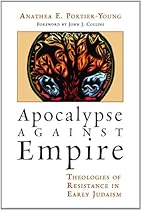Apocalypse against Empire: Theologies of Resistance in Early Judaism

| Author | : | |
| Rating | : | 4.62 (589 Votes) |
| Asin | : | 080287083X |
| Format Type | : | paperback |
| Number of Pages | : | 488 Pages |
| Publish Date | : | 2015-03-06 |
| Language | : | English |
DESCRIPTION:
Her judicious, sometimes daring, application of resistance theories to the historiography of Seleucid Judea sets a challenging precedent for future research. It is theoretically informed and sophisticated, broad-ranging and erudite, historically aware, and hermeneutically sensitive. “Make no mistake about it: this is a landmark study. Scholars and students will appreciate the careful research and fresh approach in this beautifully written book.” Sharon Pace Marquette University. In that cauldron of cultural and political conflict, the apocalypses emerge as creative vehicles for counterimperial theologizing.” Greg Carey Lancaster T
good start but could have been more accessible Michael Lewyn This book has two halves. The first half tries to explain why (assuming that the account in the Book of Maccabees is factually correct) Antiochus, the king of the Syria-based Selucid Empire, oppressed the Jews, leading to the Maccabees' revolt and of course the story of Chanukah arising from the revolt's success. The second half addresses the books of Daniel and Enoch, two books which (according to the authors) may have been Jewish responses to Selucid oppression.To begin with, even before Antiochus ascended the throne, his empire was fisca. "Excellent Work" according to Ron Clark. Excellent work.This book is well worth the read and has very current info on Apocalyptic Literature and resistance.
In Apocalypse against Empire Anathea Portier-Young reconstructs the historical events and key players in this traumatic episode in Jewish history and provides a sophisticated treatment of resistance in early Judaism. The year 167 b.c.e. A fresh and daring take on ancient apocalyptic books. She makes a sturdy case for this argument by examining three extant apocalypses, giving careful attention to the interplay between social theory, history, textual studies, and theological analysis. In particular, Portier-Young contends, the book of Daniel, the Apocalypse of Weeks, and the Book of Dreams were written to supply an oppressed people with a potent antidote to the destructive propaganda of the empire renewing their faith in the God of the covenant and answering
